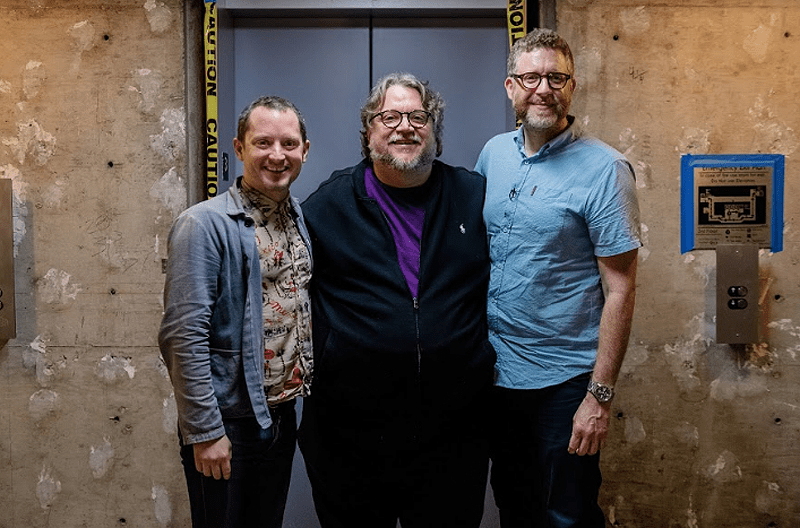Elijah Wood and Daniel Noah’s SpectreVision is a production company known for making unconventional and original genre projects like Mandy and A Girl Walks Home Alone at Night. In honor of the Halloween season, ComingSoon.net got a chance to ask Wood and Noah what their 5 Dream Horror Movies to make would be, which could be projects with actors and directors living or dead! Check out their great list below!
RELATED: Exclusive: Roger Corman Biopic Has Already Shot a Corman Cameo
Now available on Apple Podcasts, Spotify and other platforms, the two-part season finale of Shudder original podcast Visitations with Elijah Wood & Daniel Noah features an in-depth interview with Guillermo del Toro, as he invites Wood and Noah into his home — filled with genre novels, comics, and haunted ephemera — for a very personal conversation about his life and career. Del Toro talks about his isolated childhood, how life changed after his father won the lottery, how his troubled uncle gave him an entree into the magical world of movies, and the ubiquity of ghosts in his world, past and present.
Visitations with Elijah Wood & Daniel Noah is created by SpectreVision, executive produced by Daniel Noah, Josh C. Waller, Lisa Whalen and Elijah Wood, produced by Elisa Lleras and Lauren Magura, and edited by Graham Reznick (director of the Shudder Original Series Deadwax). From campfire tales to monster movies, the exhilarating, entertaining, and sometimes even therapeutic experience of facing one’s fears has always fascinated Wood and Noah, and that exploration can be seen throughout SpectreVision’s projects and the artists they work with. Past guests have included Taika Waititi, Ana Lily Amirpour, John Landis and many more.
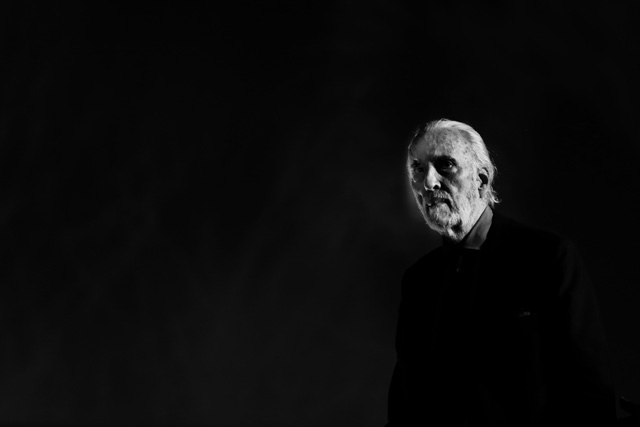
1. Unititled Christopher Lee Project
Daniel Noah: Our first one is a movie that will never be made because we were too late. But early on in our tenure with SpectreVision, we had fantasized about making a movie with Christopher Lee about him kind of like, engaging in a battle of wits with the grim reaper, and ultimately winning his immortality. It was something that we were trying to talk to him about and the timing never worked out unfortunately. We lost Chris before we were able to have the discussion, I think we’ll always regret it. So when we heard the question, that was the very first thing that popped into our minds. It will always be the one that got away.
Elijah Wood: Yeah. We were also really excited about the notion of playing into Christopher’s age at that time. He was in his 90s. Even the conceit was that he was an actor, and in some ways, trying to play into Chris’s reality and play with that a little bit within the narrative. In a way, it’s also paying tribute to Chris’ incredible work in the horror genre with the Hammer horror films and the influence that he had across the genre for decades. And it was sort of the idea of playing up some of those things and the reality of sort of the twilight of his years as well was really exciting to us. And we didn’t have a chance to talk to him about it, unfortunately. I didn’t actually have any scenes in the “Rings” movies with him, but I did get to know him a little. Chris was an incredibly lovely, gregarious human. He loved to tell stories. He had hundreds and thousands of them and lived a truly extraordinary life. We don’t even know some of the things that he did in his life because it was top secret. I mean, he was I think a former SAS in World War II. Many of his exploits are top secret. He was an exceptional human being and he was around a lot. The nature of “Lord of the Rings” was such that we were filming three movies concurrently, so sometimes there would be stages right next to each other filming something from two and some one would be next door. And so, Chris was always around and loved to tell stories and to regale all of us. It was a real treat.
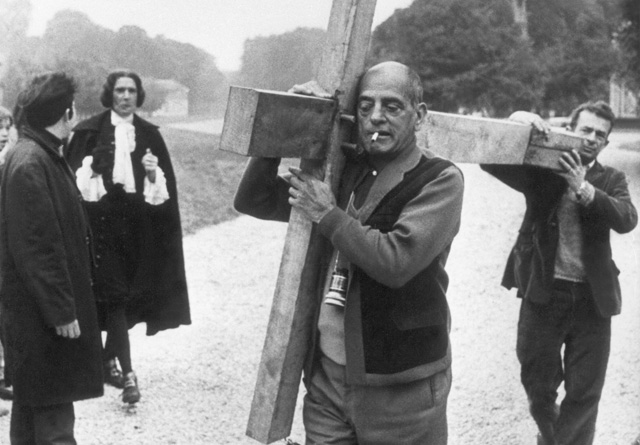
2. Unmade Luis Buñuel Demonic Film
Wood: Movie number two came up when I first got to know Àlex de la Iglesia, the Spanish genre and horror film director. He’s quite a legend in the Spanish genre scene. We made a movie years ago*, and when we were making the film, he mentioned this film that never got made. So there’s a Luis Buñuel film that he got so far as to cast and I think rehearse. Preproduction conceivably was finished. It was financed, but Buñuel abandoned the film before production actually started -before they rolled cameras- because it was, from what I understand, too demonic. It’s a script that I think is in the universe. In fact, Àlex had a copy of the script that been translated to English. That may or may not be true. We definitely had a copy of it in Spanish. It’s about a priest, and it incorporated some of the most demonic imagery I’ve ever heard of. It’s been this thing in my mind I’ve never been able to shake, that one of the great filmmakers had a movie that he was too afraid to make. It was too dark and too disturbing. I’m wondering if it would still be as disturbing? I don’t really know. I’ve never actually read the script. But it’s just been that thing like in the back of my mind. What if someone were to take that script and do something with it.
*”The Oxford Murders” (2008)
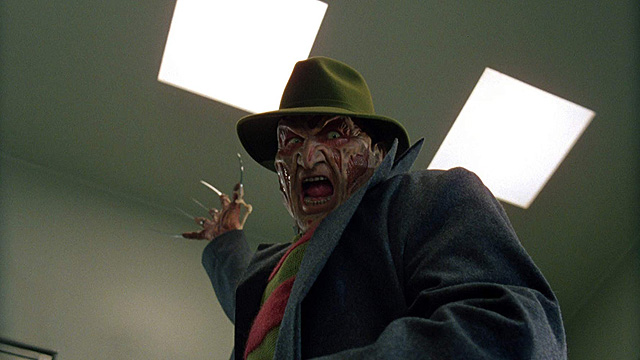
3. A Nightmare on Elm Street
Noah: Okay, number three… We have long fantasized having a crack at “Nightmare on Elm Street.” So has Adam Egypt Mortimer, who we just made “Daniel Isn’t Real” with. That film and “Elm Street” have somewhat obscure but still tangible similarities of dream worlds. As people have been seeing “Daniel Isn’t Real,” interestingly, there’s been a little movement on Twitter for Adam Mortimer to take over “Nightmare on Elm Street.” We’ve made no secret. We’ve been in touch with the rights holders many times. It’s a real dream project for us to have a chance to make a film in that franchise. And like I said, we have a very specific take on it. I think it would be very surprising and exciting to remake the franchise.
Wood: Yeah, and it definitely has that aspect of pie in the sky, of getting to play in a certain sandbox, you know? It’s a universe and a character and an idea that would be a fun sandbox to play in. It’s trying to do something different. With a lot of these classic horror films that have seen so many sequels, eventually it sort of plays itself out a little bit. It’s also interesting to think about what could we do with a franchise like that which reinvents itself or creates something that is playing with the tone and key of the franchise, but is doing it differently or taking it in a slightly new direction. It’s a fun way to think about those things.
Noah: There’s also an understandable aversion to stirring the pot too much with a formula that’s been successful. John Carpenter’s original conception of the “Halloween” franchise was that every year, there would be a new “Halloween” story. He never intended for like a Myers return, and when the studio kind of forced that as a sequel, he was able to finally come back around with Part 3. He said, “No, I want to do my thing.” And he did “Season of the Witch”, which we think is an incredible “Halloween” film. Incredible. The fans were extremely confused and angry because they had established this expectation of “Halloween” is Michael Myers. I think it’s understandable. You don’t want to shake up a formula that’s working. But on the flipside, when you’re just repeating the same formula, it’s kind of diminishing returns. They already did that well, is our point of view. That’s been handled. What are other avenues, what are other neighborhoods in this world that can be used or investigated?
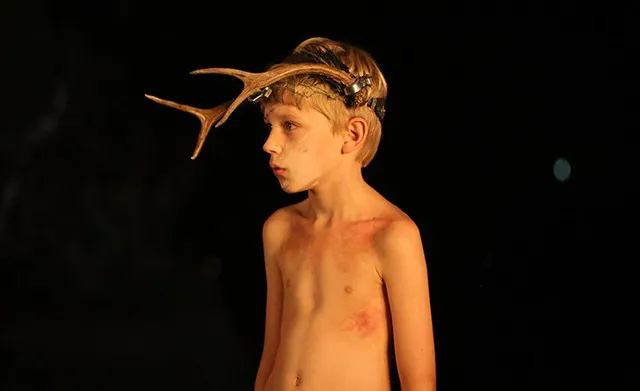
4. The Boy Trilogy
Wood: We produced a movie that Clay McLeod Chapman wrote and Craig Macneill directed called “The Boy.” That was initially based on a short film that we’d seen out of Sundance. We fell in love with it. And it was a very quiet little short about a boy isolated with his father, no mother, and the very quiet, alone solitude that this boy experienced when you’re sort of following throughout his day. What you recognize is that he’s potentially a psychopath.There are these psychopathic tendencies. We loved that and wanted to extrapolate on that into a full feature and tell that full story. That idea fascinated us: What makes people the monsters that they become. Is it lack of nurture? Is it nature? Is it something innate in them from birth? Is it a series of events that conspire to create that within someone? And it’s always been fascinating. The idea of telling the first part of that story, this sort of young boy who actually is potentially a sociopath/psychopath was really interesting. And then, he extrapolated on that hook and we thought, wouldn’t it be incredible if we did three films and each one was a different stage of that boy’s life leading to… I think we ended up on him being a teenager, sort of 18, 19. The last film would be the moment where that character then becomes a sort of iconic serial killer that we then read about later. That is when that movie ends and we imagine where that person’s going to go. So the idea initially with “The Boy” was to do a three-film trilogy tracking that person’s growth to become a psychopath serial killer. And it’s something that we still want done. The thing about it is that not enough people saw “The Boy”. So it’d be difficult to rally a financier around this, of making sequels to something that was relatively obscure. But we’re still in love with the idea, just following a character like that. We suddenly are sympathetic to and ultimately the path that that person takes and the things that come about in that person’s life, when we meet them on the path that they’re on.
Noah: Yeah, we talked about it as almost being a horror version of “Boyhood.”

5. House of Leaves
Noah: Maybe a movie, maybe a TV series. We’re not sure, but we’re not alone in fantasizing about turning Mark Danielewski’s masterpiece “House of Leaves” into something filmed. We realized that ultimately it’s not only one of the great horror novels, it’s one of the great contemporary novels. We know Mark a little bit. He’s a fascinating guy. And yeah, we’ve always dreamed of adapting it.
Wood: It’s almost like it could be about the novel itself, really playing with that medium to tell that story. It’s three narratives that are kind of intertwined. When you read the book, it’s a very difficult thing to imagine how one would crack that because it is so dense that it includes all these appendices and footnotes and there’s a lot of ephemera information baked into the structure of the thing. But it would be quite difficult to figure out how to make that work within the context of the film. We’ve certainly imagined what that could be. Mark actually wrote a pilot. He went o Netflix with that, and ultimately the deal fell through. But he released the pilot script for free online, and it’s incredible. For a while we had all sorts of ideas as to what a version of that would look like. To read what he wrote, it’d be perfect to adapt what he wrote as a novel. And he includes himself in it, his own narrative perspectives. So there’s a kind of meta aspect to it. I encourage anybody who’s a fan of the book to read the pilot script and shed a tear for the fact that it may never see the light of day. Writing a novel and then adapting your novel to a screenplay is not necessarily a foregone conclusion that it’s going to go very well. They’re very different mediums. But he managed to do it beautifully and it makes for a very frustrating read.
Some helpful links . . .
HOUSE OF LEAVES pilot script PDFhttps://t.co/foFriJWKdV
ONLY REVOLUTIONS Book Club (begins 7/9)https://t.co/kKBXexgRpM
THE FAMILIAR giveaway for new readershttps://t.co/7FeUsi5Tl7
THE FAMILIAR Book Club Q&A transcriptionshttps://t.co/cOxFfebchi pic.twitter.com/YSBWSAhr4c
— Mark Z. Danielewski (@markdanielewski) July 3, 2018
Click here to purchase House of Leaves by Mark Z. Danielewski!
(Photo Credit: Getty Images)
